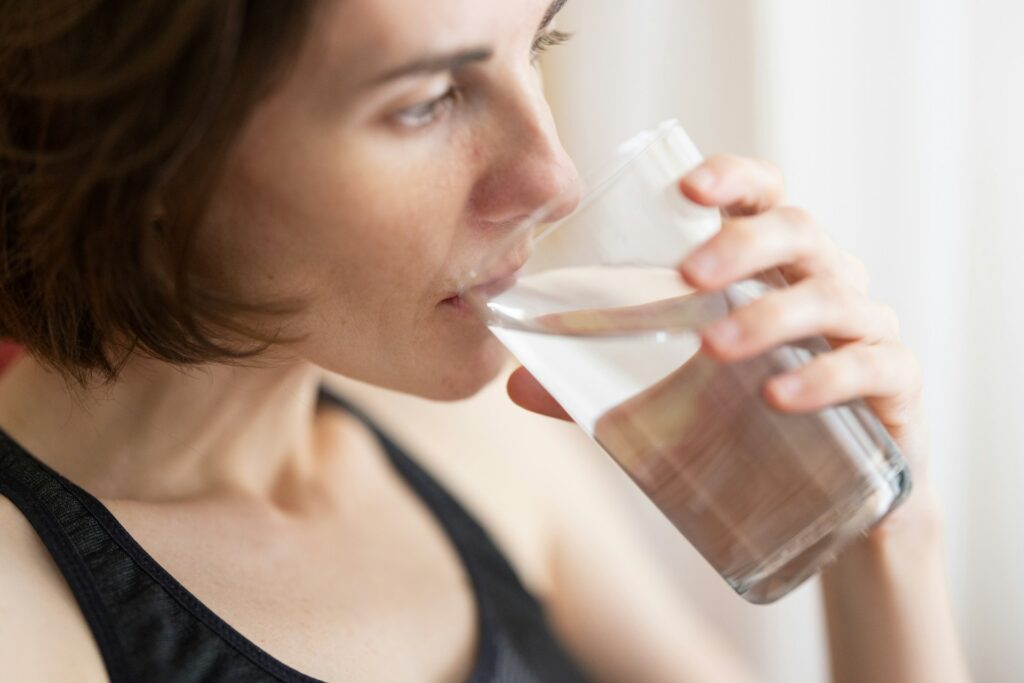Do you often reach for a glass of water only to feel thirsty again moments later? Persistent thirst can be more than just a minor inconvenience — it could be your body’s way of signaling an underlying health issue. Understanding the causes of excessive thirst and knowing when to seek medical attention from a primary care doctor in Southington, CT, is essential for maintaining your overall well-being.
Key Takeaways
- Recognize dehydration symptoms like dark urine and fatigue to prevent health complications.
- Diabetes can cause excessive thirst; manage symptoms with personalized care from Docs Primary Care – Southington.
- Dry mouth and frequent urination may signal serious health issues; consult a primary care doctor promptly.
- High sodium intake from salty foods can contribute to persistent thirst; balance your diet accordingly.
- Don’t ignore persistent thirst—it could be your body’s way of signaling an underlying health issue.
- Stay hydrated by drinking enough water daily, tailored to your needs, with guidance from medical professionals.
- Early intervention for excessive thirst can improve health outcomes; trust Docs Primary Care – Southington.

Understanding Excessive Thirst (Polydipsia)
Excessive thirst, known as polydipsia, is when a person experiences a persistent and unquenchable thirst, often consuming more than 6 liters of fluid daily. This condition extends beyond the normal thirst felt after salty meals, intense exercise, or exposure to the sun, which can typically be satisfied by increasing fluid intake.
The factors influencing daily water needs, such as activity levels and climate, do not account for polydipsia. Instead, this condition can persist for days, weeks, or longer, which leaves individuals feeling constantly thirsty, accompanied by a dry mouth. Polydipsia is often associated with polyuria, the condition of frequent urination, passing at least 2.5 liters of urine within 24 hours.
8 Reasons Why You’re Always Thirsty
1. Dehydration
Dehydration occurs when insufficient water is in your body to perform everyday functions, which signals an urgent need for fluid intake. This condition can arise from several activities and health issues.




When you’re dehydrated, thirst isn’t the only symptom you’ll experience. Other signs include:





Children may show additional signs of dehydration, such as:




These symptoms highlight the body’s critical need for water to replenish and maintain essential bodily functions.
2. Diabetes
Diabetes, characterized by elevated blood sugar levels, can significantly disrupt your body’s average fluid balance, leading to excessive thirst. This condition causes your kidneys to work harder to filter and absorb the excess glucose. When they can’t keep up, the extra sugar is excreted into your urine, dragging fluids from your tissues and leading to dehydration.
Among excessive thirst, here are other accompanying symptoms of diabetes:



Managing diabetes and controlling blood sugar levels are crucial to mitigating these symptoms. Regular consultation with a trusted primary care doctor in Southington, CT, and monitoring of blood sugar levels can help manage diabetes effectively.
3. Diabetes Insipidus
Diabetes Insipidus is a rare disorder that disrupts the body’s fluid regulation, which leads to an imbalance that causes intense and persistent thirst, regardless of how much fluid is consumed.
Unlike diabetes mellitus, which involves high blood sugar levels, diabetes insipidus is a deficiency in the antidiuretic hormone (ADH) or the kidney’s response. This hormone helps the kidneys manage the amount of water in your body. When ADH levels are inadequate, or the kidneys can’t respond effectively, it results in excessive production of dilute urine.
Diagnosis often involves water deprivation tests and hormone analysis to determine the cause and extent of the disorder. Treatment for diabetes insipidus may include medications that reduce urine output and dietary adjustments to help manage symptoms.
4. Dry Mouth
Dry mouth, medically known as xerostomia, occurs when the salivary glands in your mouth don’t produce enough saliva to keep your mouth wet. It can lead to a feeling of thirst, but it’s characterized by more than just a lack of moisture. Saliva plays a crucial role in digesting food, protecting teeth from decay, and controlling bacteria in the mouth. Without sufficient saliva, you may experience a range of uncomfortable symptoms.
Common causes of dry mouth include:
- Medication Side Effects: Many prescription and over-the-counter medications can reduce saliva production.
- Autoimmune Diseases: Conditions like Sjögren’s syndrome directly affect the body’s moisture-producing glands.
- Radiation Therapy: Treatments for cancer near the head and neck can damage salivary glands.
Alongside dry mouth, other accompanying symptoms include:
- Difficulty Swallowing: A lack of saliva makes it challenging to swallow food and liquids.
- Altered Taste: Foods may taste different, or you might have a metallic taste in your mouth.
- Oral Health Issues: Increased risk of tooth decay, gum disease, and mouth infections.
- Cracked Lips: The lips and mouth may appear dry and cracked, contributing to discomfort.
5. Anemia
Anemia is a condition characterized by a deficiency in the number of red blood cells (RBCs) or the amount of hemoglobin in the blood, leading to insufficient oxygen transport to the body’s tissues. This lack of oxygen can indirectly trigger mechanisms that increase thirst. Although not as directly a cause of thirst as other conditions, anemia can contribute to feelings of dehydration because the body may crave fluids to boost blood volume and improve oxygen delivery.
Here are the primary factors contributing to anemia:
- Iron Deficiency
- Vitamin B12 or Folate Deficiency
- Chronic Diseases: Conditions like kidney disease can interfere with erythropoietin production, a hormone needed for RBC formation.
Accompanying symptoms of anemia include:
- Fatigue and Weakness: Due to the reduced oxygen supply to muscles and tissues.
- Pale or Yellowish Skin: Reflects the reduced hemoglobin and RBC count.
- Shortness of Breath: The body struggles to deliver enough oxygen during physical activity.
- Dizziness or Lightheadedness Can occur due to lower-than-normal blood pressure from the reduced blood volume.
Addressing anemia involves treating the underlying cause with a primary care doctor in Southington, CT. This may include dietary changes to increase iron, vitamin B12, and folate intake or medical treatments for chronic conditions.

6. Hypercalcemia
Hypercalcemia is a condition characterized by higher-than-normal levels of calcium in the blood. This excess calcium can interfere with the body’s normal functions, including its ability to regulate fluid balance.
People with hypercalcemia often find themselves feeling thirsty constantly despite drinking ample fluids. This is because the kidneys work overtime to filter out the excess calcium, which leads to increased urine output and dehydration.
Accompanying symptoms of hypercalcemia can vary but often include:
- Frequent urination
- Kidney stones
- Nausea
- Abdominal pain
- Fatigue
- Weakness
- Confusion
In more severe cases, hypercalcemia can lead to bone pain and muscle weakness as the body leaches calcium from the bones, compromising their strength and structure.
Treatment for hypercalcemia depends on the underlying cause and the severity of the condition.
Mild cases might be managed by staying hydrated and using medications to manage symptoms. However, more severe cases may require more aggressive treatments, such as intravenous fluids to rehydrate the body and medicines to lower blood calcium levels.
A trusted primary care doctor in Southington, CT, is crucial in diagnosing and managing hypercalcemia. They can conduct initial assessments, order tests to determine the cause of the high calcium levels, and refer patients to specialists if needed.
7. Medications
Certain medications can affect the salivary glands or alter kidney function, leading to decreased saliva production or changes in fluid balance. As a result, individuals may feel a persistent need to drink water to alleviate the discomfort of a dry mouth or to quench their unending thirst.
Common types of medications that may lead to these symptoms include:
- Diuretics, which are often prescribed for high blood pressure, can increase urine production.
- Antidepressants can affect the body’s hydration levels and saliva production.
- Antihistamines and decongestants are known for their drying effects on the mucous membranes.
- Some medications are used in the treatment of anxiety and psychiatric disorders, which can alter thirst perception.
- Chemotherapy drugs may affect saliva production and lead to dehydration.
Experiencing excessive thirst or dry mouth while on medication can be bothersome. Still, it’s essential to consult a primary care doctor in Southington, CT, before changing prescribed treatments. Primary care doctors in Southington, CT, can review your medication regimen and assess whether adjustments are necessary.
8. Salty Foods
Consuming salty foods can lead to an immediate increase in thirst. High sodium levels in the body draw water out of cells, signaling the brain to trigger the thirst response to dilute the excess salt. The kidneys also play a role in this process, as they require more water to excrete the extra sodium through urine, further contributing to the sensation of thirst.
Accompanying symptoms from consuming salty foods, aside from increased thirst, may include:
- Swelling in different parts of the body due to fluid retention
- High blood pressure as the body retains more fluid to help dilute the sodium
- A feeling of bloating or discomfort
To counteract the effects of high sodium intake and manage thirst, it’s recommended to:
- Increase water consumption to help flush out the excess sodium
- Opt for fresh, unprocessed foods that are naturally low in sodium
- Read food labels carefully to choose products with lower sodium content
If you find yourself constantly reaching for water after meals or dealing with the effects of a high-sodium diet, a consultation with a primary care doctor in Southington, CT, can be beneficial. They can offer personalized advice on dietary changes and hydration strategies to better manage your thirst.

When to See a Primary Care Doctor in Southington, CT
When it comes to managing your health, understanding when to seek the expertise of a primary care doctor in Southington, CT, is crucial. Persistent thirst might seem like a minor inconvenience. Still, it can be a symptom of underlying health issues that require professional attention.
Here are situations and conditions that warrant a visit to your primary care doctor:
Persistent Symptoms
If you’ve increased your water intake but still feel excessively thirsty all the time, it’s a sign that something more serious could be at play. A primary care doctor in Southington, CT, can evaluate your symptoms, conduct necessary tests, and determine if your thirst is due to dehydration, dietary choices, or an indicator of a more significant health concern.
Unexplained Weight Loss or Fatigue
Experiencing unexplained weight loss or persistent fatigue along with excessive thirst could indicate conditions such as diabetes or thyroid disorders. A seasoned primary care doctor in Southington, CT, can provide a thorough assessment and guide you through the diagnostic process to identify the root cause.
Changes in Urination
Increased thirst and changes in urination patterns, such as frequency, urgency, or appearance, could signal various conditions, including diabetes or urinary tract infections. Consulting with a trusted primary care doctor in Southington, CT, can help diagnose and treat the underlying cause effectively.
Medication Side Effects
It could be a side effect if you’ve started new medications and noticed increased thirst. A reliable primary care doctor in Southington, CT, can review your medications, assess side effects, and adjust your treatment plan if necessary.
Dietary Concerns
A primary care doctor in Southington, CT, can offer nutritional counseling for individuals consuming high amounts of salty foods or caffeinated beverages and experiencing persistent thirst. They can suggest dietary adjustments to help manage your thirst and improve overall hydration.
What to Expect When You Visit a Primary Care Doctor in Southington, CT
When you schedule a visit with a primary care doctor in Southington, CT, for concerns about excessive thirst, you can expect a comprehensive evaluation to identify the underlying cause of your symptoms.
Initial Consultation
During your first visit, a primary care doctor in Southington, CT, will discuss your symptoms, including the frequency and intensity of your thirst. This aims to comprehensively understand your health history and any related symptoms you may be experiencing.
Physical Examination
Following the initial consultation, your primary care doctor in Southington, CT, will conduct a physical examination. This step is crucial for identifying any physical signs that might indicate the cause of your excessive thirst, such as signs of dehydration, changes in weight, or signs of complications related to diabetes.
Diagnostic Tests
Based on the initial findings, the primary care doctor in Southington, CT, may order several diagnostic tests. Standard tests include blood glucose levels to check for diabetes, kidney function tests, and electrolyte testing to assess for imbalances that might cause thirst.
Review of Findings
Once the results are in, your primary care doctor in Southington, CT, will review the findings with you. This discussion will explain any diagnoses made and the factors contributing to your excessive thirst. It’s an opportunity for you to ask questions and express any concerns.
Treatment Plan
Your primary care doctor in Southington, CT, will outline a treatment plan tailored to your condition. If necessary, this plan may include lifestyle adjustments, dietary recommendations, medication, or specialist referrals. The goal is to address the underlying cause of your thirst and improve your overall health.

FAQs
Can psychological factors cause excessive thirst?
Yes, psychological conditions like stress or anxiety can sometimes lead to increased thirst. Discussing these concerns with a primary care doctor in Southington, CT, can help address the root cause and effectively develop strategies for managing symptoms.
How much water should I be drinking?
Determining the appropriate amount of water to drink daily depends on various factors, including age, activity level, and health conditions. Adults are often advised to drink around 8 glasses, or about 2 liters, of water per day to maintain proper hydration. However, individual water needs can vary significantly. Consulting a primary care doctor in Southington, CT, is recommended for personalized guidance tailored to your circumstances.
Can dehydration occur even if I’m drinking plenty of fluids?
Yes, dehydration can occur despite drinking fluids, especially if you’re losing more fluids than you’re taking in due to factors like intense exercise, vomiting, or diarrhea. Additionally, certain medical conditions or medications can affect fluid balance in the body. If you suspect dehydration despite adequate fluid intake, seeking medical advice from a primary care doctor in Southington, CT, is recommended for proper evaluation and treatment.
How can I prevent dehydration during exercise?
To prevent dehydration during exercise, drink water before, during, and after physical activity. Avoid excessive sweating and replenish electrolytes with sports drinks if exercising intensely or for prolonged periods.
What role does aging play in increased thirst?
As individuals age, changes in the body’s hydration regulation mechanisms, decreased kidney function, and certain medical conditions more commonly seen in older adults can increase thirst. Additionally, older adults may have reduced thirst sensation, leading to inadequate fluid intake despite increased fluid needs. Regular check-ups with a primary care doctor in Southington, CT, can help monitor hydration status and address any age-related factors contributing to excessive thirst.
Ready to Quench Your Thirst? Contact Docs Primary Care – Southington!
If you’re constantly battling thirst, it’s more than just an inconvenience—it’s a sign that your body is signaling for help. Whether making lifestyle adjustments or seeking medical advice, taking action is crucial. For residents in Southington, CT, Docs Primary Care – Southington offers the expertise of reliable and experienced primary care doctors ready to assist you. With the help of our primary care doctors in Southington, CT, you can get to the root of the issue and find the necessary treatment to improve your quality of life.
Remember, persistent thirst should not be ignored. Contact Docs Primary Care – Southington to schedule an appointment today.

